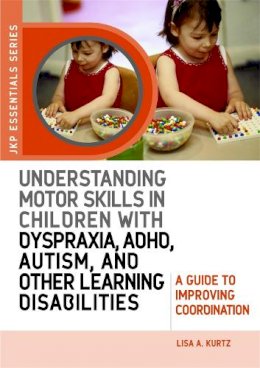
Understanding Motor Skills in Children with Dyspraxia, ADHD, Autism, and Other Learning Disabilities: A Guide to Improving Coordination
Elizabeth A Kurtz
The book is user-friendly and includes clear diagrams in each section, along with tables to outline key points. I found these very useful and they are an easy reference/ reminder, for example, they include a normal development chart, what assessments are available and their main aims.'
- National Association of Paediatric Occupational Therapists
Coordination problems often make everyday activities a challenge for children with learning disabilities. This accessible manual offers practical strategies and advice for helping children with coordination difficulties.
The author explains how to recognize normal and abnormal motor development, when and how to seek help, and includes specific teaching strategies to help children with coordination difficulties succeed in the classroom, playground, and home. She describes a wide range of therapeutic methods and provides a comprehensive list of resources.
Full of practical help, this is essential reading for anyone caring for, or working with, children with developmental motor concerns.
Product Details
About Elizabeth A Kurtz
Reviews for Understanding Motor Skills in Children with Dyspraxia, ADHD, Autism, and Other Learning Disabilities: A Guide to Improving Coordination
Speech & Languager Therapy in Practice, Julie Guilliatt, assistant practitioner,(SLT), North Lincs PCT The practical information contained in this book would be a useful addition to any paediatric therapy department or school library, for both students and professionals involved in the management of chidren with these disabilities.
Phisiotherapy The seven chapters are short and well-structured and written in an accessible style for the professional and non-professional reader alike. Illustrations and bullet points are used throughout which make the content accessible and user friendly. I would recommend the book to students, newly qualified therapists and therapists returning to work in the area, as well as parents aand teachers of children with motor co-ordination delay, with some provisos.
Journal of Therapy and Rehabilitation
